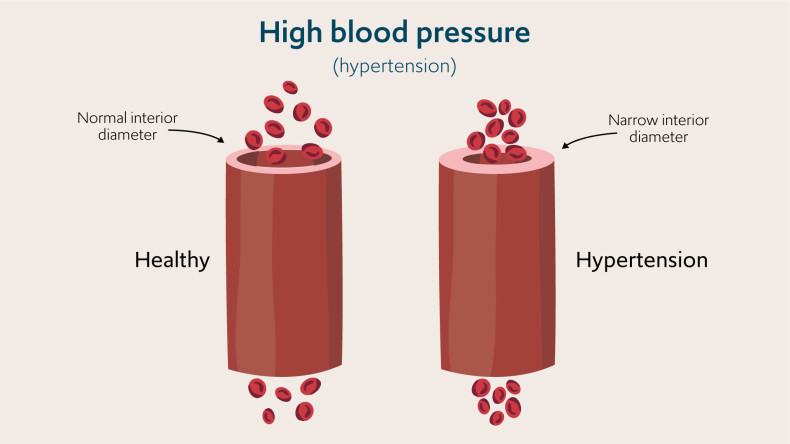Hypertension is the medical term for high blood pressure. Hypertension affects approximately a third of adults in the United Kingdom, but many people are unaware that their blood pressure is high because the condition is often without symptoms.
“If hypertension isn’t treated, it can increase your risk of having a heart attack or stroke. However, lifestyle changes and (if required) medication can reduce your blood pressure and protect against future disease and disability,” explains consultant cardiologist, Dr Rakesh Sharma.

Middle aged man reading his own blood pressure using digital machine
Hypertension, or high blood pressure, is a common condition in which the force exerted by the blood flowing through your arteries is raised. The WHO says:
‘Hypertension ̶ or elevated blood pressure ̶ is a serious medical condition that significantly increases the risks of heart, brain, kidney and other diseases.’
Your blood pressure is measured in millimetres of mercury or mmHg. Your blood pressure reading is given as two numbers, separated by a slash:
- Systolic pressure: the systolic pressure is the first number. It is the pressure when your heart beats and the ventricles pump blood out of your heart and around your body and are the higher value
- Diastolic pressure: diastolic pressure is the second number. It is the pressure when your heart relaxes and fills with blood between heartbeats and is the lower value

Hypertension is caused by a narrowing in the arteries which makes it more difficult for the heart to pump blood around the body.
Hypertension symptoms
Many people with high blood pressure don’t experience any symptoms, so you should get regular checks even if you feel fine. However, it’s important to see your doctor for advice and a blood pressure measurement if you notice:
- blurry vision
- nosebleeds
- breathlessness
- chest pain
- feeling dizzy and light-headed
- headaches
- palpitations
How to measure blood pressure
Your health professional will measure your blood pressure using a device called a sphygmomanometer. It is a quick, painless and non-invasive test.
They wrap a cuff around your upper arm and inflate it. The cuff slowly deflates, and a digital device will measure the pressure in your arteries when your heart beats (systolic) and relaxes (diastolic).
If you’re nervous or stressed about seeing a doctor, your blood pressure may be artificially high. If this is the case, your doctor may lend you a blood pressure machine to perform regular readings over time, you can buy affordable devices online, or your medical team may arrange ambulatory blood pressure monitoring or ABPM.
What is ambulatory blood pressure monitoring?
“Ambulatory blood pressure monitoring or ABPM uses a blood pressure cuff to automatically measure your blood pressure at repeated intervals throughout the day and night. It gives a more accurate reflection of the fluctuations in your blood pressure when you’re performing normal daily activities and can also give an average value,” explains Dr Sharma.
The National Institute for Clinical Excellence (NICE) says ABPM is the most accurate method for confirming hypertension, reducing unnecessary treatment and predicting medical problems that are related to raised blood pressure.
What is normal blood pressure?
Your blood pressure will change according to the time of day, stress and activities. Normal, healthy blood pressure can vary between individuals – but in adults, it is typically between 90/60mmHg-120/80mmHg.
Your doctor may diagnose hypertension if your blood pressure is consistently above 130/80mmHg.
Who is at risk of hypertension?
“Anyone can develop high blood pressure, but several factors can increase your risk. Adults over 40 should have a blood pressure check every five years at least,” explains Dr Sharma.
However, it’s sensible to have more frequent checks if you have one or more risk factors. These include:
- increasing age: people over 65 are more likely to have hypertension
- a family history of high blood pressure
- ethnicity: you may be at increased risk if you are of black African or Caribbean descent
- unhealthy diet: high amounts of salt and not enough fruit and vegetables can increase your risk of hypertension
- living an inactive lifestyle
- raised BMI: obesity or being overweight can increase blood pressure
- excessive alcohol consumption
- drinking too much caffeine in tea, coffee, cola or energy drinks
- smoking
- insomnia, sleep disturbance or deprivation
- stress: a high-stress lifestyle or problems managing your stress response can increase your risk of hypertension
- chronic health problems like diabetes, kidney disease, thyroid disease and lupus can make you more likely to develop hypertension
Hypertension treatment
High blood pressure can increase your risk of having a heart attack or stroke – and the risk gets higher as your blood pressure rises. The good news is that blood pressure medication, lifestyle changes and controlling any other risk factors for heart disease can all help.
Effective hypertension management could include:
Lifestyle changes
Changing your lifestyle can moderate your hypertension risk factors, reduce your blood pressure and decrease the risks to your heart. You can’t change your ethnicity or your genetic heritage, but you can make a difference by:
- stopping smoking
- cutting down on alcohol
- reducing caffeinated drinks
- exercising regularly
- losing weight to achieve and maintain a healthy BMI
- getting enough sleep
- managing stress in your life by making lifestyle changes or learning techniques to manage your response to stress using relaxation techniques, cognitive behavioural therapy (CBT) or yoga
Dietary changes
The food you eat can affect your blood pressure. You can prevent hypertension by:
- Eating a healthy balanced diet with plenty of fruit and vegetables. The DASH diet was designed to lower blood pressure. As well as fruit and vegetables, it focuses on fish, lean meat, whole grains and pulses, and healthy fat from avocados, oily fish and nuts.
- Reducing salt in your diet. Try not to add table salt and consider hidden salt in ready meals, sauces, and fast foods.
- If you are overweight, improving your diet to achieve a healthy weight can help
Managing other cardiac risk factors
Other chronic conditions can increase your risk of heart disease; these include diabetes and hyperlipidaemias. If you have hypertension, it’s crucial to control these to reduce your overall cardiac risk.
Hypertension medication
Medication can usually effectively control your blood pressure and protect your health. You may need a single drug or a combination of treatments to get optimum results. Hypertension medications could include:
- ACE inhibitors: ACE stands for angiotensin-converting enzyme inhibitors. They typically end in ‘pril’ and include the drugs enalapril and ramipril
- Angiotensin receptor blockers: Known as ARBs, these usually end in ‘artan’. They include the drugs candesartan, losartan and olmesartan
- Calcium channel blockers: CCBs often end in ‘dipine’ and include amlodipine and nifedipine
- Diuretics: Also known as ‘water tablets’, they flush excess water out of the body. Examples include indapamide and bendroflumethiazide
- Beta-blockers: Reduce blood pressure and slow down the heart; examples include Bisoprolol and Nebivolol
- Alpha-blockers: Relax the blood vessels and reduce blood pressure. An example is Doxazosin
Book an appointment
For more information or to book an appointment, please contact our customer care team.